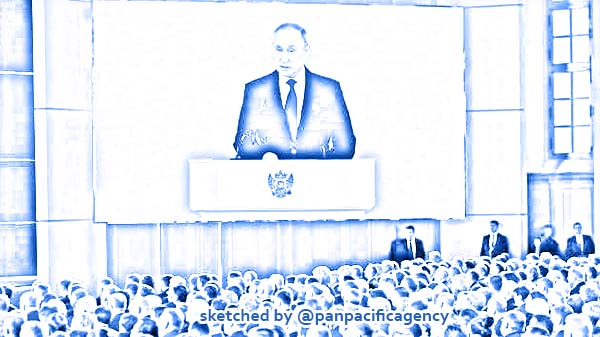[Analytics] Why Putin wants Russia to vote on new Constitution sooner rather than later

Vladimir Putin, Russia’s president, as he speaks during his annual state of the nation address in Moscow, Russia, on Wednesday, Jan. 15, 2020. Bloomberg. Sketched by the Pan Pacific Agency.
This year has not gone as planned for Vladimir Putin. By naming the new date for a postponed vote on key changes to the Russian constitution, he has made a move to get things under control—perhaps before they get worse. James Rodgers specially for the Forbes.
The coronavirus pandemic has led not only to the vote being delayed, but also to the postponement of a massive military parade to celebrate the Soviet Union’s victory over Nazi Germany in WWII. Then there’s the looming longer term damage to the economy which the virus has caused.
The vote was originally due to take place April 22. It was postponed because of fears that lines at polling stations could lead to an increase in the spread of the coronavirus. The fear was well founded. The number of cases in Russia has continued to grow. Official figures published June 6 put the number of infections at 458,689, according to the TASS news agency.
Putin Could Be In Power Until 2036
The vote matters because it asks Russians to approve changes to the country’s constitution: changes that would allow Putin to stay in power until 2036. He is currently due to step down in 2024.
Russians are now due to go to the polls July 1.
Can Putin get the change he wants? While there seems little prospect of the vote not going his way—one characteristic of Putin’s long political career has been electoral success—the polls are not as encouraging as the Kremlin might like.
The most recent data published by Russia’s Levada Center suggest that 44% of voters are set to approve the planned changes, with 32% against. In April, the figures were 47% and 31%.
Kremlin: Don’t Speculate On Voters Saying ‘No’
Putin’s spokesman, Dmitry Peskov, insisted June 5 that the changes would only go ahead if voters backed them. Peskov seemed reluctant to imagine things not going Putin’s way. “I am not sure whether it is appropriate to make such speculations,” he said in remarks cited by TASS.
Putin’s critics have accused him of acting like a ‘tsar’—the name given to the Russian emperors whose dynasty was swept away in the Russian revolution of 1917.
As Reuters reported June 1, Putin’s opponents also suspect that the vote may be rigged to make sure the Kremlin gets the result it wants. Such allegations are not new, and video apparently showing voters submitting more than one ballot paper emerged after Putin’s last election victory in 2018.
The timing now is critical. With part of his electoral success in the past being due to his ability both to impress world leaders at international summits, and to talk to ordinary people in their language, after two decades at the top Putin may have lost some of his common touch.
The pandemic has shown that no political leader is immune to its effects on their popularity. Putin’s own approval rating hit a 20 year low in April—but, at 59%, it is still pretty healthy.
Tough Times Ahead For Russia’s Economy
The military parade—postponed from May 9—is now due to go ahead June 24, the week before the vote on the constitution. The national celebration of past glory may help to deliver a feelgood factor.
Yet, as in many other countries hit by the pandemic, there are undoubtedly tough times ahead. As Reuters reported May 21, Russia’s economy ministry predicts that the economy will shrink 5% in 2020, with households’ real disposable incomes seen falling 3.8%. An economic hit like that can lead to unhappy voters.
It is hard to escape the conclusion that Putin wants the constitutional changes done now because the poll numbers could look even less promising later in the year.
James Rodgers